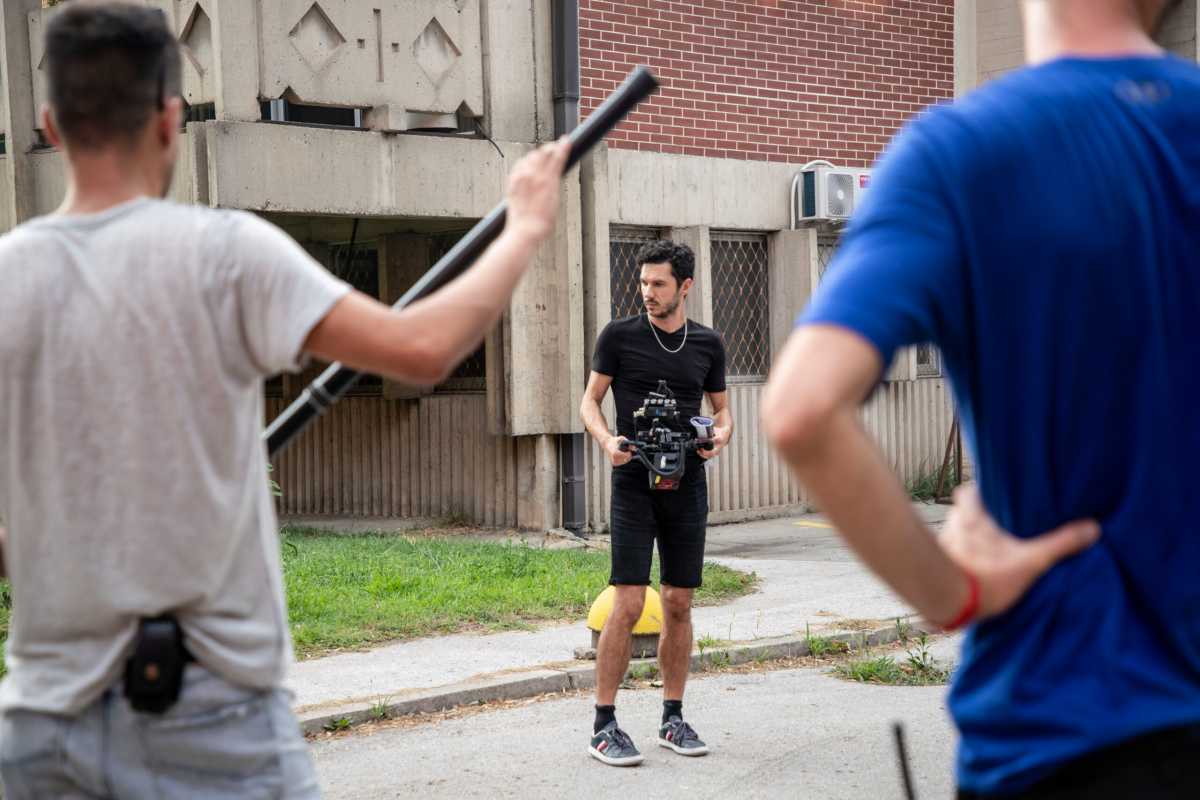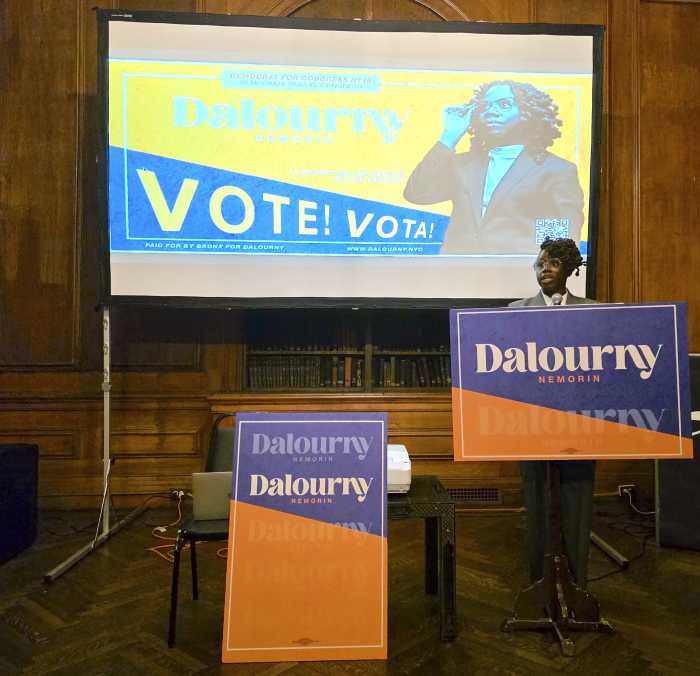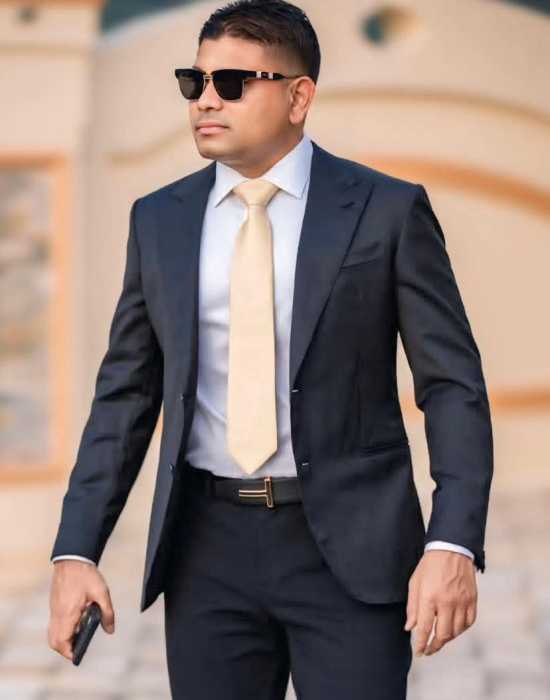Out gay filmmaker Goran Stolevski (“Of an Age”) returns to his native Macedonia for his warm “hangout” film, “Housekeeping for Beginners.” Dita (Anamaria Marinca) reluctantly agrees to care for her lover Suada’s (Alina Sebran) children, the teenage Vanesa (Mia Mustafi) and the pre-teen Mia (Dzada Selim). She also lives with Toni (Vladimir Tintor), a gay man, whose current boyfriend, Ali (Samson Selim) also seems to have moved in. As they form a makeshift family — Dita and Toni get married — legal and other forces threaten to upend things.
Stolevski’s film deals with serious issues involving queer people and ethnic minorities in Eastern Europe, but he films it all with a light touch that immerses viewers in the lives of the characters. The filmmaker spoke with Gay City News about his warm and engaging new film.
What inspired this story of a queer family passing as “straight” as it were?
That’s not how it started in my head. Essentially, an old friend of mine posted a photo online from his youth, from 1970s Melbourne, when he was living with his boyfriend and eight gay women in a household. I thought, “What a fun space to live in!” It was a cocoon where you could be relaxed about how you live your life in a society where it wasn’t the case most of the time. I wanted to transport that setup to the present day and a country where it is still complicated to be queer — which is the majority of countries today. I didn’t select Macedonia to stand in for itself, but pretty much all of Eastern and Southern Europe.
The film features several gay or lesbian characters, but they are not always able to live authentically. What can you say about the film’s idea of a “chosen family”?
It is a family imposed by circumstances. Most of the household were kicked out of their homes. This house presents itself as a possible sanctuary. I’m drawn to stories with characters that are in a position they cannot escape from and have to figure out how to live their best possible lives given that. That is very common for queer people in these places, where your choices are limited and made for you.
The film is very intimate and episodic. Can you talk about your approach to storytelling and creating the film’s tone? It’s really a fun hangout film.
“Hangout film” is a good phrase — I didn’t think of that, but that’s the feeling I was working towards. I wanted the story to keep catching you by surprise. Things are percolating underneath all along. I assume the viewer knows an Eastern European gay person’s life is going to be difficult and we don’t have to explain why. Taking that for granted, as a storyteller, you look for fun bits. No one’s life is a morose social drama every hour of every single day.
Because there was so much darkness and heaviness shaping these lives, I felt my job was to look for lighter moments, and the fun in it, and mess with the perception that things may be socio-politically dire. There is hope; it’s not all doom and gloom… I wanted every color to be available. If there is a tone of colors not prominent in the backdrop, we’ll find it in the costumes. In the same way, I want to experience joy and sadness, fun and pain, romance, and everything in the story.
Can you talk about the situation for LGBTQ people in North Macedonia? Is it safe to be out there?
On paper, it’s hard to find the positives. I’m openly queer, and I haven’t had many problems when I go there. But I’m not representative of a gay teenager in Macedonia who realizes they are drawn to the same sex. There are one or two other people out in the media, and that’s quite a recent phenomenon. Legally, there is still progress that needs to be made. The issue isn’t so much the laws, but the legal system doesn’t really function; the laws are not really imposed. Every legal protection helps, but it doesn’t mean much. You can’t avoid being stared at or ostracized in your workplace if you are openly queer. The younger generations’ attitudes are different. The majority of people in their 20s are accepting of queerness. I feel the outlook is positive. But it is still extremely complicated. The basic reality is there is always the risk of violence. If I was holding my husband’s hand on the street, I could still get bashed. You can’t get around that, and the person who [bashes] will not get arrested.
There are discussions about race, ethnicity, legal issues raised, and other topics. What prompted you to cram all these issues into one story?
I wanted that story to percolate. I don’t set out with here’s an issue, and I’ll include it. It’s more what does day-to-day life feel like, and how do we capture those facets for these people in that time and place? The [presentation of] ethnicity and race is reality. A small percentage of population is Roma, but a quarter of the kids I knew growing up were Roma, and a quarter of the country is Albanian, which is Dita’s ethnicity. It wasn’t an ideological statement, it was more, “This is what life feels like.” The more variety you have, the more richness and situational conflict emerges from that.
The film uses music to create mood. The characters sing or play the piano. It bonds them. Can you describe how you selected the music you did to create emotion?
A lot of it emerged from having just made “Of an Age.” I discovered what music can bring in terms of texture and character layering. The songs and music shape and reflect the characters. In terms of the nondiegetic music, I was looking for something that would complement what is on screen rather than underlining it. So, it connected you to an element that was otherwise understated, which goes back to the principle of every facet of human experience being there. When there is hectic chaos, there is a soft contemplative piano tune by Bach to provide a thread of feeling. When you reflect on these events, that is the feeling you associate. It was being in the characters’ skin and honoring every feeling they have rather than reducing it to one and overemphasizing that.
“Housekeeping for Beginners” is a film about healing. It shows how this makeshift family can get through crises big and small together by leaning on each other. What observations do you have about the film’s message?
Healing and grief need to take place, but life doesn’t stop for you to be able to do that. I wanted to stay with them through that process and honor the reality of what that would be like; it would not be easy. I wanted to honor that on screen. When life is difficult for someone, and you adapt that into a story and make it simpler, I find it a little offensive. I wanted to be realistic. I didn’t want it to be too bleak. I am very emotionally attached to these characters, and I don’t want them to suffer unnecessarily. I want people to feel connected to these group of people who feel real, and detailed, and three dimensional despite their minority statuses. They are a stand-in for something that is universal. You are not less universal because you happen to belong to a minority. Your feelings are not minority or niche. They are as intense as anyone’s.
“Housekeeping for Beginners” | Directed by Goran Stolevski | Opening April 5 at the Angelika Film Center and the AMC Lincoln Square | Distributed by Focus Features.













